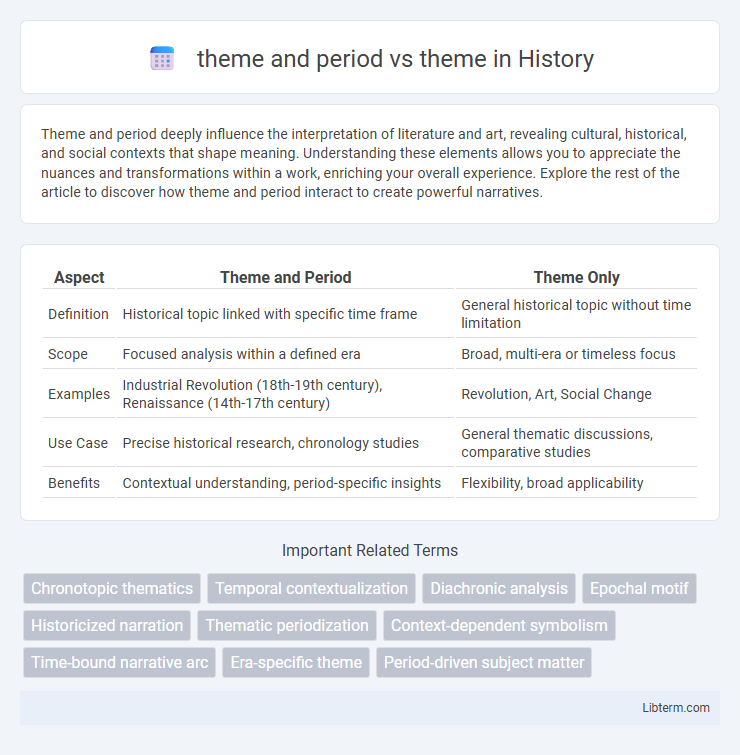Theme and period deeply influence the interpretation of literature and art, revealing cultural, historical, and social contexts that shape meaning. Understanding these elements allows you to appreciate the nuances and transformations within a work, enriching your overall experience. Explore the rest of the article to discover how theme and period interact to create powerful narratives.
Table of Comparison
| Aspect | Theme and Period | Theme Only |
|---|---|---|
| Definition | Historical topic linked with specific time frame | General historical topic without time limitation |
| Scope | Focused analysis within a defined era | Broad, multi-era or timeless focus |
| Examples | Industrial Revolution (18th-19th century), Renaissance (14th-17th century) | Revolution, Art, Social Change |
| Use Case | Precise historical research, chronology studies | General thematic discussions, comparative studies |
| Benefits | Contextual understanding, period-specific insights | Flexibility, broad applicability |
Understanding "Theme and Period" in Literary Analysis
Theme and period in literary analysis offer distinct yet interconnected perspectives; theme represents the central idea or message conveyed by the text, while period denotes the historical and cultural context influencing the work. Analyzing theme within its period provides insight into how societal norms, events, and prevailing philosophies shape literary expression. Understanding this relationship enriches interpretation by linking thematic elements to specific temporal frameworks, highlighting authors' responses to their environments.
Defining Theme: Core Concepts and Importance
Theme represents the central idea or underlying message of a literary work, providing insight into human experience and societal values. The period in which a piece is created significantly shapes its theme by influencing the cultural, historical, and social context surrounding the narrative. Defining theme involves identifying the recurring motifs and symbols that reflect universal truths, making it essential for deeper literary analysis and appreciation.
What Is "Period" in Literary Contexts?
In literary contexts, "period" refers to a specific era characterized by distinct cultural, historical, and stylistic features influencing the themes and narratives of works produced during that time. Unlike "theme," which centers on the underlying messages or central ideas within a text, "period" situates those themes within a broader temporal and sociocultural framework that shapes authorial perspective and literary conventions. Understanding the period helps contextualize themes, revealing how historical events and prevalent attitudes impact storytelling and thematic development.
The Interplay Between Theme and Historical Period
The theme of literary works is deeply influenced by the historical period in which they were created, reflecting societal values, conflicts, and cultural norms of that time. Themes such as freedom, justice, or identity often gain nuanced meanings when viewed through the lens of specific eras like the Renaissance, Victorian age, or postmodern period. Understanding this interplay enhances the interpretation of texts by situating thematic concerns within their authentic historical and cultural contexts.
Examples of Themes Shaped by Their Period
Themes such as social justice during the Civil Rights Movement encapsulate struggles for equality and human rights reflective of the 1950s-1960s American context. In contrast, postmodern literature from the late 20th century explores themes of identity and fragmentation influenced by cultural skepticism and technological advancements. War literature from World War I often embodies themes of disillusionment and the futility of conflict, mirroring the traumatic experiences of soldiers during the 1914-1918 period.
Examining Universal Themes Versus Period-Specific Themes
Universal themes such as love, conflict, and identity transcend historical periods, resonating across cultures and generations. Period-specific themes often reflect unique social, political, or cultural issues of a particular era, like post-war disillusionment or Renaissance humanism. Analyzing literature or art through these lenses reveals how timeless human experiences coexist with the distinct influences of their time.
How Period Influences Authorial Choices in Theme
The period in which a work is created profoundly influences the themes an author chooses, as historical context shapes societal values, conflicts, and ideologies reflected in literature. For example, Romanticism's emphasis on nature and individualism contrasts sharply with Victorian literature's focus on social order and morality, highlighting how authors adapt themes to resonate with contemporaneous cultural and political climates. Period-specific events, such as wars or technological advancements, often drive thematic exploration of topics like human resilience, progress, or existential angst, demonstrating the inseparable link between temporal context and thematic development.
Theme and Period: Impact on Audience Interpretation
Theme and period significantly influence audience interpretation by framing the context in which a narrative unfolds. Thematic elements convey universal messages, while the period setting shapes the audience's understanding through historical and cultural perspectives. Together, they create a layered experience that deepens emotional resonance and critical engagement.
Analytical Approaches: Distinguishing Theme from Theme and Period
Analytical approaches distinguish between theme as the central idea or message conveyed by a work and theme coupled with period, which contextualizes the theme within a specific historical or cultural timeframe. Examining theme alone highlights universal motifs such as love, power, or identity, while integrating period reveals how these themes are influenced by societal norms, events, and ideologies of a particular era. This distinction enables a deeper understanding of both timeless narrative elements and their temporal manifestations in literature, art, or media studies.
Why Considering Both Theme and Period Enriches Literary Insight
Examining both theme and period reveals how historical context shapes literary meaning, highlighting societal values and conflicts influencing narrative development. Themes gain depth when analyzed alongside the era's cultural, political, and social conditions, enriching interpretation with authentic perspectives. This dual focus enables readers to grasp the nuanced interplay between timeless human experiences and specific temporal realities.
theme and period Infographic

 libterm.com
libterm.com